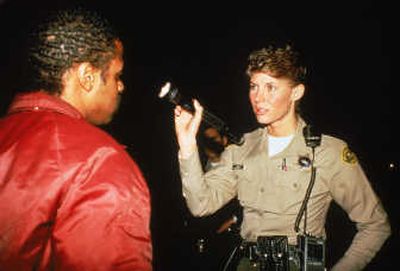Want reality? ‘Cops’ has it

When discussing “Cops,” series mastermind John Langley can’t help mentioning a few of its 700-plus episodes.
Like the one where an overweight woman lunged at an officer with a butcher knife.
“She falls down and the knife goes all the way in her gut!” says Langley. “I mean, to the hilt! And she lived!”
He’s clearly still amazed.
“And then we had the naked burglar in Philadelphia. The cops answer the call, and the guy’s on PCP, which for some reason makes people take their clothes off. It takes about seven cops to subdue him.
“Then, a year or two later in Pittsburgh, the same thing: a naked burglar coming out of a school.” Langley chuckles. “Ver-r-ry bizarre.”
Not every episode of “Cops” is ver-r-ry bizarre. Even so, the prospect of seeing something unexpected, unhinged or simply true-to-life has kept viewers – more than 6 million on average last season – tuning to “Cops” each Saturday since March 1989. (Two half-hours air back-to-back on Fox at 8 p.m.)
But you don’t have to watch “Cops” to have felt its cultural impact. Countless scripted and reality series have borrowed its “video verite” storytelling style.
It inspired the Comedy Central spoof “Reno 911,” and its reggae-flavored theme song (“Bad boys, bad boys”) was memorably borrowed by “The Simpsons”: “Bad cops, bad cops! Springfield cops are on the take. But what do you expect for the money we make?”
“Cops” is an institution, however unlikely. And lodged off the beaten path on TV’s least-watched night. Which suits Langley fine.
“Each new Fox exec comes in and has a lot of other issues to take care of every other night,” he says. “Then he gets to Saturday and goes, ‘Oh, we got “Cops,” let’s just leave that alone.’ So we’re very happy, just plugging along.”
It was in the early 1980s that Langley, 64, an academic-turned-documentary filmmaker, had the idea for “Cops.” He envisioned a no-frills cinematic ride-along with police that would capture the job, on the street, through their eyes.
But when he pitched it to the networks, he couldn’t get arrested.
“Nobody thought you could do a series without a host, without a narrator, without a script or without actors,” explains Langley.
“I kept insisting, and they kept saying no, until finally there was a writer’s strike in 1988, and there was about to be an actor’s strike in sympathy. Suddenly a show with no actors, host, script or writers sounded pretty good.”
Especially to Fox. And when “Cops” premiered on the struggling new network, it made a splash.
“It had a big ‘wow factor,’ ” Langley recalls. ” ‘Documentary in extremis’ … ‘existential variety show’ … things that people weren’t used to seeing.”
It also seemed to put cops in a highly favorable light.
“It’s told from the point of view of police officers,” says Morgan Langley, John’s 33-year-old son and vice president of his production company. “Because of that, people assume that the show has a very pro-law-enforcement message.”
“But we’re not editorializing about what we show you,” the elder Langley cautions. “We don’t say it’s the truth, but we’re saying it’s certainly a truth.
“I was not exactly police-friendly when I first got into this,” he adds. “I mean, I’m a kid of the ‘60s. In my day, police weren’t so popular. But once I started doing the show, I learned that people in public service can be very heroic.”
And no one is playing to the camera, he insists.
“When a cop is chasing a guy in a stolen car, the viewer can say, ‘Well, the camera’s there, it must really alter things because of the Heisenberg Principle of Uncertainty,’ ” Langley laughs. “That’s a crock! They don’t know the camera’s even there – trust me!”
Adds Morgan Langley: “I think ‘Cops’ has a purity that scripted shows and ‘managed reality’ shows don’t have. You’re not getting kids drunk and telling them to live together.”
Its nimble camera crews (10 of them) patrol the nation gathering 400 hours of footage per week to whittle into each episode.
Each half-hour comprises an action segment, then a slow-things-down segment, then a leave-the-viewer-with-a-
message segment.
In one recent episode, for instance, a cop in Boston gave chase to a youth with a gun. Then Las Vegas police patiently defused a domestic dispute. And finally, in Boise, an officer displayed remarkable compassion for a pair of troubled women (with a reminder to all: Stay off crack).
It all suggests that “Cops” isn’t so much about crime as about everyday people who get themselves jammed up with society and each other – and how the cops who encounter them try to sort it out.
People being people, “Cops” just might last forever.